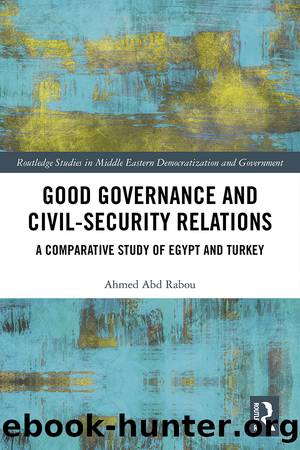Good Governance and Civil-Security Relations: A Comparative Study of Egypt and Turkey by Ahmed Abd Rabou

Author:Ahmed Abd Rabou [Rabou, Ahmed Abd]
Language: eng
Format: epub
Tags: Comparative Politics, Middle Eastern, Political Science, World, Political Freedom
ISBN: 9781000172935
Google: y5r6DwAAQBAJ
Goodreads: 54707332
Publisher: Routledge
Published: 2020-09-01T00:00:00+00:00
The policing system in Egypt
The establishment of a professional and civil police force in Egypt dates back to 1878, when Riad Pasha was appointed minister of the interior. Before that, Egypt had known traditional forms of policing that were conducted mainly by military personnel aided by civilian non-uniformed policemen. Three years after the establishment of the modern police, the British occupied the country and the responsibility for the organization of the police shifted entirely to British officials, who detached the military from policing to avoid their politicization (Al-Ansary, 1990).
The police under the British occupation were mainly concerned with criminal activities. However, alongside the ordinary functions of the maintenance of order, the police were also required to suppress demonstrations against the British occupation, and to aid the British in eliminating any form of military resistance to the occupation. The period between the British occupation and the 1952 revolution witnessed the establishment in 1903 of the âConstables School,â the establishment of the âPolice Schoolâ in 1911, and other developments in the organization and structure of the Egyptian police. Ethnic division was a key factor in the police organization under the British rule, where Egyptians filled inferior positions compared to the superior positions filled by their English superiors. This continued until the formal independence of Egypt in 1922. However, British interference in policing functions continued to a lesser degree until the 1952 revolution that ended all forms of British intervention, culminating in the evacuation of all British troops from Egypt in 1954 (Al-Ansary, 1990).
The establishment of the political police department in the ministry of the interior dates back to 1913 when it was established by the British to help eliminate political dissidence and armed resistance. This department continued under different names and different administrations. It was used by all regimes to suppress political dissidence, using notorious torture and cruel investigative techniques. Most commentators rightfully ascribe the eruption of the 2011 revolution to the cruelty of the police, more specifically the political police, or what was later officially called the State Security Investigations Apparatus.
Legally speaking, the 1971 constitution designated the president of the republic as the chief commander of police forces. Under Mubarak, the president was the head of the Supreme Council of the Police (SCP), a body composed of senior police officials responsible for formulating broad policies, determining priorities, and managing the operations of the Egyptian police.
Egyptâs domestic security forces fall under the executive authority of the Ministry of Interior (MoI). In 2009 MoI employed 1.7 million individuals, including 850,000 police personnel and administrative staff, 450,000 Central Security Forces (CFS) personnel, and 400,000 individuals as part of the State Security Investigations Services (SSIS) (El-Hennawy, 2011)
Under Mubarak, MoIâs size and influence grew markedly, due partly to the increase in violent confrontations between the government and Islamist insurgents in the 1990s, and partly to the need to contain growing political and socio-economic discontent. According to Egyptian economic expert Abdel Khalek Farouk, the number of those employed by MoI grew from 124,000 in 1951 to 200,000 in 1971 to 800,000 in 2006.
Download
This site does not store any files on its server. We only index and link to content provided by other sites. Please contact the content providers to delete copyright contents if any and email us, we'll remove relevant links or contents immediately.
Tasting Mother-In-Law (Mother In Law Son In Law Erotic & Taboo Short Story) (Naughty In Law Book 3) by Rush Penny(416)
EARLY GRAVE (Jake Lassiter Legal Thrillers Book 12) by Paul Levine(370)
Carl Schmitt Between Technological Rationality and Theology by Hugo E. Herrera;(366)
The Love Conspiracy: An Age-Gap Lesbian Romance by Arias J.J(362)
The Rise of Critical Islam by Youcef L. Soufi(356)
HABEAS PORPOISE (Solomon vs. Lord) by Levine Paul(355)
Democratic Quality in Southern Europe by Tiago Fernandes(343)
If We Burn by Vincent Bevins(342)
Tor and the Dark Net · Remain Anonymous Online and Evade NSA Spying (Tor, Dark Net, Anonymous Online, NSA Spying) by Smith James(338)
Natural Rights on the Threshold of the Scottish Enlightenment by Unknown(338)
Toward revealing the controversy of bacterial biosynthesis versus bactericidal properties of silver nanoparticles (AgNPs): bacteria and other microorganisms do not per se viably synthesize AgNPs by Fatthy Mohamed Morsy(304)
Light-evoked depolarizations in the retina of <Emphasis Type="Italic">Strombus <Emphasis>: Role of calcium and other divalent cations by Unknown(302)
Women before the court by Lindsay R. Moore(262)
International Humanitarian Law and Justice by Mats Deland Mark Klamberg Pål Wrange(242)
When Hope and History Rhyme by Douglas Burgess(238)
The Crimes of Womanhood by A. Cheree Carlson(236)
To Raise and Discipline an Army by Joshua Kastenberg(227)
A New Daddy by orphan_account(225)
Witches, Wife Beaters, and Whores by Elaine Forman Crane(223)
